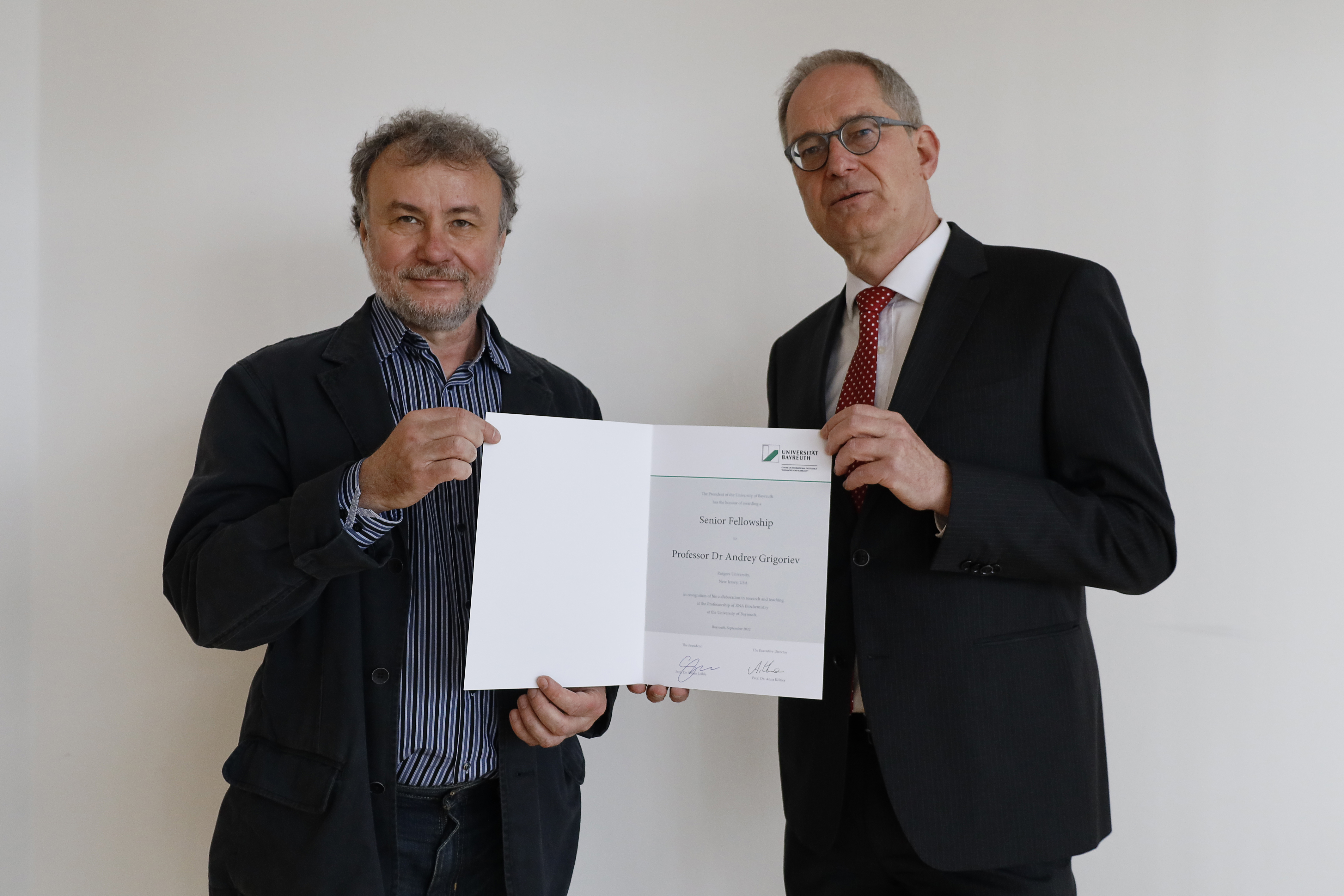Meet the Fellow: Andrey Grigoriev
Predictive models of small RNA-directed mRNA surveillance in planarians
One shared interest – two approaches: Professor Andrey Grigoriev (Rutgers University, USA) and his host, Professor Claus Kuhn (RNA Biochemistry) perfectly combine their respective research foci in a flourishing field: small RNAs.

Prof. Andrey Grigoriev and Prof. Dr. Stefan Leible, President of the University of Bayreuth
What are the foci of your joint research funded by the Fellowship?
Andrey Grigoriev: Our joint research with Prof. Claus Kuhn focuses on the properties of piRNAs - small RNA molecules that regulate a number of processes in complex organisms. Our focus organism is planarians, flatworms that have remarkable regenerative abilities, where the piRNAs also play a role. We proceed through all the stages of that process - from finding piRNA clusters in the genome to their subsequent generation and targeting action. Ultimately, machine learning methods allow us to predict targets of piRNAs and other short RNAs and thus describe the regulatory processes in a cell in much greater detail. This can have tremendous impact on our understanding of regulation and function in multiple cell types.
In what way is your work interdisciplinary, and what does interdisciplinarity mean to you in academic work and life?
AG: My host, Professor Kuhn, and his colleagues at the University of Bayreuth focus on experimental research. I work in computational biology and my research depends on the results experimentalists produce in order to generate and test predictive models. We have a shared interest in the function of small RNA and approach it from both ends, experimental and computational.
Interdisciplinary science rewards its participants by providing a more complete picture, not available from a point of view provided by a single discipline. And the interpretation is also an integrative process in this case.
What is in your opinion the future of your field, and in what way can research in your field contribute to meeting the urgent challenges of our time?
AG: Small RNAs have been studied for decades but their roles are still elusive. That is still the case despite RNAs already becoming major players as therapeutic agents. Today, "everybody and their grandmother" have heard about RNA. Yet there is so much to learn and continued research will bring further transformative changes to biomedical practice. The field will flourish, and a very exciting future awaits.
What does international research mobility mean to you?
AG: I have worked in four countries, thus mobility has always been an essential component of my career. The recent challenges to such mobility have been created by the declared Covid-19 pandemic and the restrictive measures taken by many governments. For a long time, this has prevented travel to conferences, reduced networking opportunities, and affected experimental work. Luckily, by the time of my trip to Bayreuth the restrictions were no longer there. Yet I value the fact that, thanks to the commitment of the University of Bayreuth to funding collaborative research, other colleagues were supported in fostering new research connections, even in the times of limited travel. Keeping international mobility is vital for academic innovation.
What was your personal experience during your stay?
AG:The University campus is great, large yet cosy. The city is pretty cool, friendly inhabitants, a lovely center, and many small colorful Wagner statues adorn it in a very charming way. Reaching Bayreuth is a challenge, though, and I became familiar with the Regionalbahn during my trip.
The Fellow
Dr. Andrey Grigoriev is full Professor at Rutgers, the State University of New Jersey, USA. He has worked in the field of computational biology for 35 years, in four different countries, both in academic and industrial settings. His interests revolve around different aspects of genome evolution and organization, from finding genome variants to interpreting them. Dr. Grigoriev's fascination with how the information contained in a genome manifests itself includes, among other things, functionality of small RNAs, short molecules able to regulate multiple cellular processes. This topic has resulted in the current collaborative effort with University of Bayreuth.
